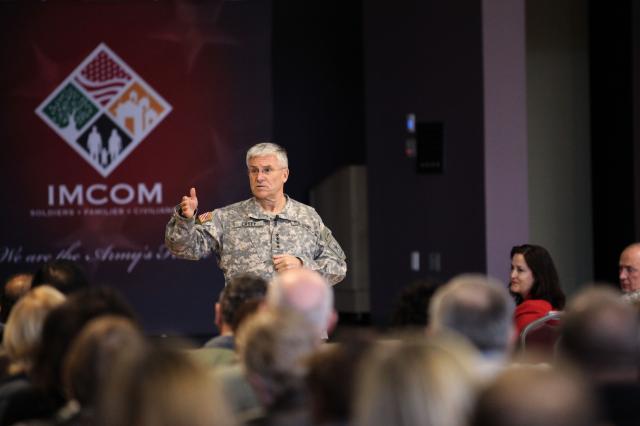Gen. George W. Casey Jr., chief of staff of the Army, visited the Installation Management Command headquarters Friday, saying the Army has accomplished more in these years of sustained conflict “than humanly possible.”
Casey, chief of staff of the Army since 2007, said the Army has grown by 100,000 Soldiers just since 2007, converted every single brigade to a new modular formation, modernized Soldiers’ skill sets and liberated two countries from tyranny – all since 2004.
He said, “No other organization in the world could have done that, and everybody, Soldiers, families, and civilians, are a part of it.”
Casey made the comments during a town hall meeting at IMCOM’s headquarters in San Antonio, and thanked the IMCOM team for sustaining the Army’s home during this era of persistent conflict.
Lt. Gen. Rick Lynch, commanding general of IMCOM, who first served with Casey in the 1st Cavalry Division, noted Casey’s leadership.
“We are blessed today to have our chief of staff of the Army come here and talk to us about where we are and where we are going as an Army,” Lynch said.
Lynch also served on Casey’s staff when he was commander of Multi-National Force-Iraq.
Casey outlined the state of the Army and the challenges it faces into the next decade. He spoke of the success of restructuring the Army on a “rotational readiness” model so at least one third of the Army, including the National Guard and Reserve, will be available for deployment at any given time.
The Army Force Generation model, known as ARFORGEN, fosters a flexible, capable force that remains prepared for unexpected events — at an operational tempo sustainable with a volunteer force, Casey explained.
Dwell time for Soldiers between deployments will increase from 18 months to 24 months to allow time for rest and recuperation. Casey credited IMCOM employees for sustaining the installation home front while Soldiers are defending freedom abroad.
“We have a very resilient force, but that doesn’t happen by magic,” he said. “The men and women of the Army understand that there are people that care about them and are willing to go the extra mile for them. You all have been a key component of my ability to sustain this force over the past five years.”
Challenges for the next decade include sustaining the Army’s combat edge, rebuilding the force during wartime, bolstering resiliency and – most of all – adapting to a constrained budget, he said.
Though the Army’s budget has increased substantially since 2001, Casey emphasized efficiency as the key to maintaining essential programs for Soldiers and families.
“Our economy is the biggest national security priority,” he said.
Casey, who will soon be leaving his post as his chief of staff appointment ends, pointed out that the bond of trust throughout the Army has sustained it throughout conflict.
“It is that bond of trust that exists in a Special Forces A-team, that exists in a platoon, that exists all across our Army – even in every headquarters in our Army – that has held us together as an institution,” he said.










